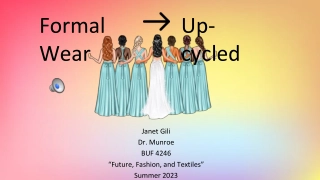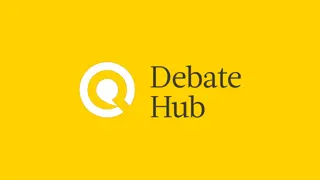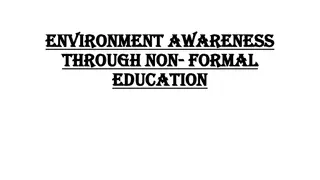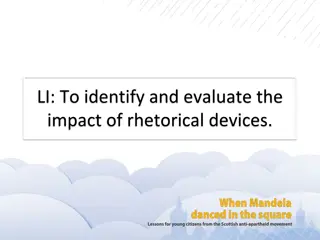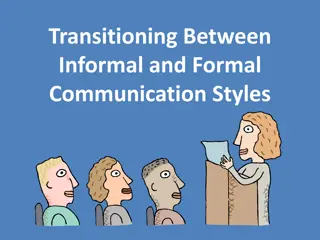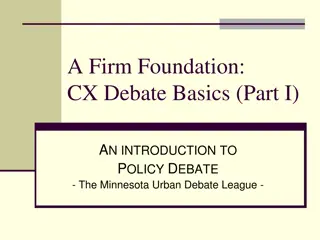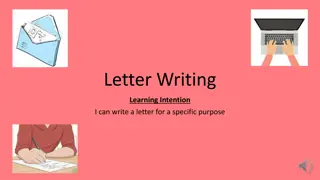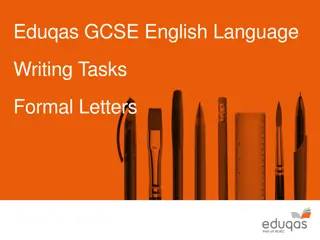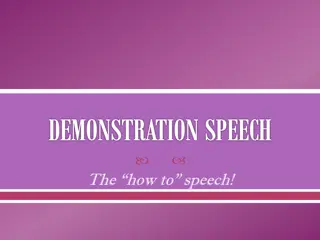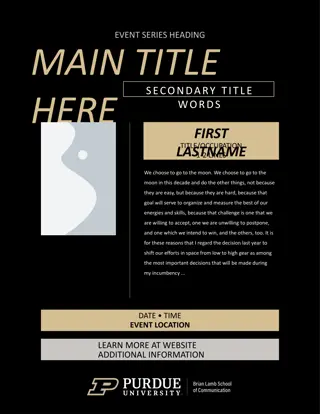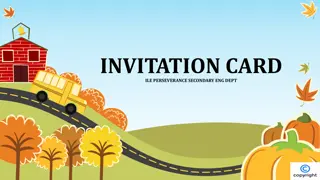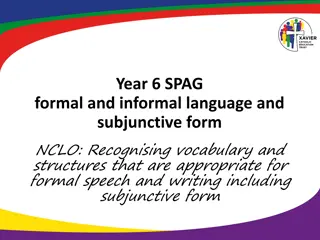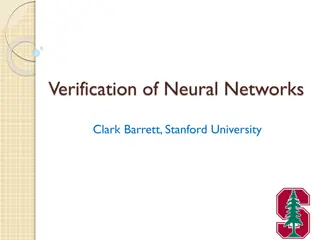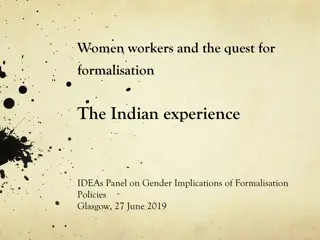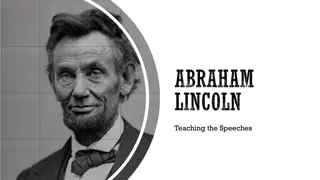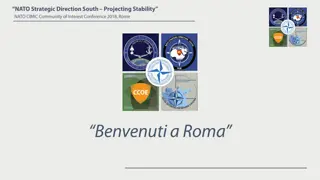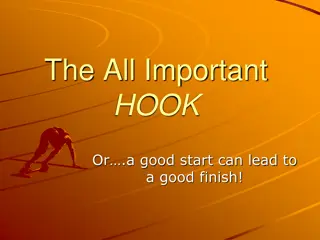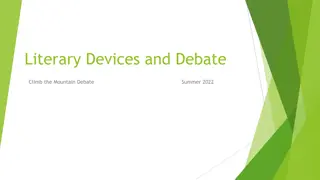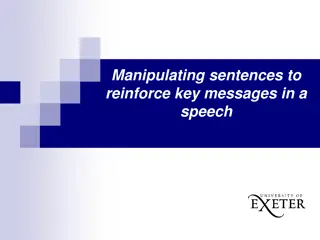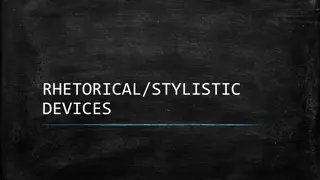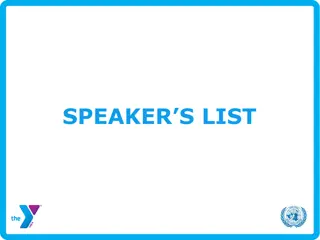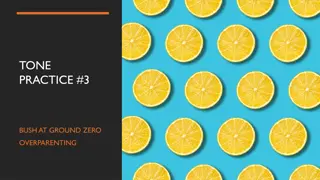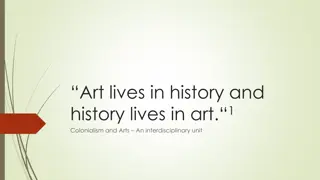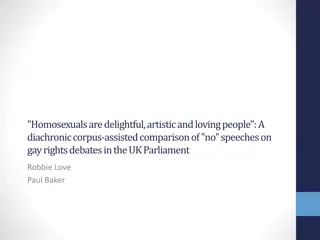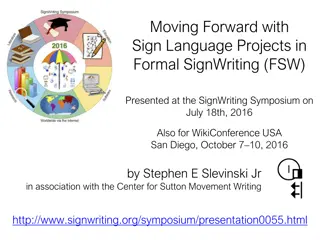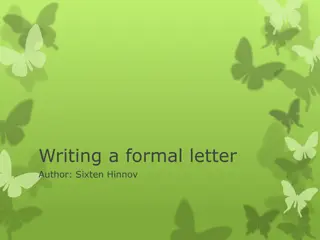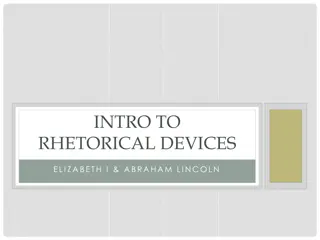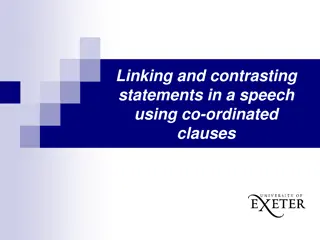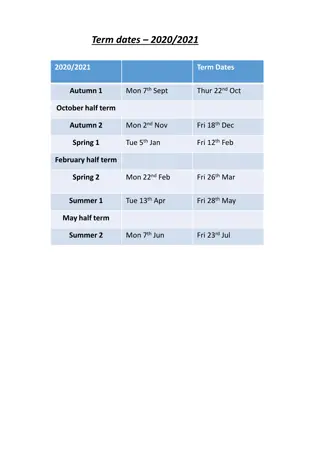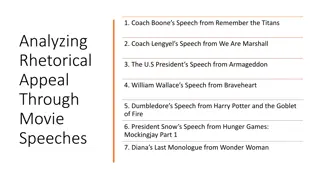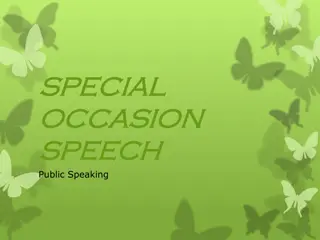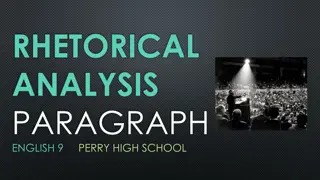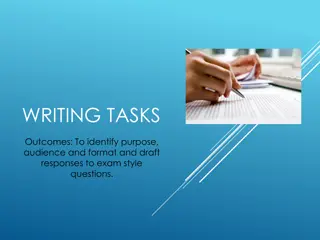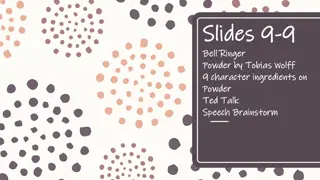Sustainable Fashion Solutions for Repurposing Formal Wear
Transforming formal wear from single-use items into sustainable fashion solutions is vital for reducing textile waste and environmental impact. This article explores the challenges of post-party formal dresses, the environmental consequences of textile waste, and innovative approaches to upcycling d
10 views • 14 slides
Mastering Formal Letter Writing in Education
Enhance your formal letter writing skills in education with a focus on job applications and key features of formal correspondence. Explore the purposes of writing letters and learn to choose the appropriate writing style for each type. Practice completing expressions for formal letters effectively.
5 views • 27 slides
Enhancing Speeches: Techniques and Devices for Impactful Presentations
Enhance your speeches with techniques such as repetition, imagery, anecdotes, and more for maximum impact. Explore how to use these methods initially, discuss them with others, and gradually integrate them into your delivery organically. Watch a compelling speech by Aaron Beverly to glean insights o
3 views • 5 slides
Governance and Managerial Leadership of Formal Social Protection in Africa: Insights from Cameroon's National Social Insurance Fund (CNPS)
This presentation delves into the governance and managerial leadership of formal social protection in Africa, focusing on Cameroon's CNPS system. It discusses the institutional evolution of social protection, the challenges faced by bureaucratic and political stakeholders, and the roles of various s
1 views • 8 slides
Enhancing Environmental Awareness Through Non-Formal Education Initiatives
Non-formal education plays a crucial role in enhancing environmental awareness through programs such as eco-clubs, population education initiatives, and the National Green Corps. These initiatives aim to educate individuals, especially children, about environmental issues, leading to better decision
1 views • 7 slides
Impact of Rhetorical Devices in Speeches by Malala Yousafzai, Martin Luther King Jr., and Greta Thunberg
The speeches by Malala Yousafzai, Martin Luther King Jr., and Greta Thunberg exemplify the power of rhetorical devices such as rhetorical questions, repetition, emotive language, and direct address. These devices effectively convey their messages and evoke strong emotions, highlighting the importanc
0 views • 11 slides
Mastering Communication Styles: Informal vs. Formal
Explore the nuances of transitioning between informal and formal communication styles, understand the components of different forms of communication, and learn when to apply each style in appropriate situations. Delve into the characteristics and examples of informal and formal communication, and di
1 views • 18 slides
An Introduction to Policy Debate: Understanding CX Debate Basics
Policy debate, also known as CX debate, involves structured arguments on policy topics. Teams of two students engage in constructive speeches and rebuttals, focusing on an annual resolution. Round structures, differences between constructive and rebuttal speeches, and debate strategies are key compo
0 views • 18 slides
Learning to Write a Formal Letter of Complaint
Explore the process of writing a formal letter of complaint with the help of visual aids and an example scenario. Learn about the structure and key components of such letters, including addressing the issue, expressing concerns, and requesting resolution. Enhance your letter-writing skills by unders
2 views • 15 slides
Mastering Formal Letter Writing: Tips and Examples for Success
Explore the art of formal letter writing with this comprehensive presentation covering the fundamentals of planning, content, features, and layout. Learn how to address the audience, define the purpose, structure your letter effectively, and craft the right tone. Discover essential tips for opening
2 views • 22 slides
Mastering the Art of Demonstration Speeches
Unlock the secrets of delivering engaging demonstration speeches by learning the essence of explaining and showing how to do something effectively. Discover the essential components, guidelines, and topic ideas for crafting a compelling demonstration speech that captivates your audience's attention
0 views • 16 slides
Inspirational Speeches About Space Exploration
Explore the powerful speeches about space exploration, emphasizing the challenges and importance of venturing into the unknown. Leaders like John F. Kennedy and Carl Sagan inspire with their words, highlighting the unity of humanity on Earth and the vastness of the cosmos.
0 views • 6 slides
Formal Invitation Card Etiquette
Formal invitations play a significant role in conveying important event details and setting the tone for the occasion. They provide complete information including the occasion, names of hosts and invitees, date, time, venue, and more. The format of formal invitations follows specific guidelines, usi
0 views • 16 slides
Formal and Informal Language with Subjunctive Form
Explore the distinctions between formal and informal language, along with the appropriate usage of the subjunctive form. Learn how to enhance your writing by identifying key vocabulary and structures for formal speech and writing. Get insights on recognizing and utilizing formal language in various
1 views • 9 slides
Software Bugs and Formal Verification in Critical Systems
Software bugs have caused catastrophic events like radiation overdoses and rocket explosions, emphasizing the importance of formal verification in ensuring software correctness. Formal verification uses mathematical models to prove software correctness, offering higher assurance, especially in safet
1 views • 26 slides
Challenges and Policies in Formalising Women Workers in India
The Indian labor market faces significant challenges in formalizing women workers, with a noticeable decline in women's employment especially in rural areas. Despite recent policy attempts at formalization, such as the Unorganized Workers Social Security Act 2008 and the Maternity Benefits Act, wome
0 views • 19 slides
Abraham Lincoln's Impact on Sectionalism and Civil War Through His Speeches
Explore Abraham Lincoln's famous speeches to shed light on the era of sectionalism and Civil War. Discover Lincoln's purpose and craft as an author by examining his best-known speeches, revealing his stance on slavery and efforts to preserve the union during a tumultuous period in American history.
0 views • 36 slides
Agenda for Day 1: Welcome Note, Keynote Speeches, Syndicate Work, and Networking
The agenda for Day 1 includes welcome notes from the Dean and Director, insightful keynote speeches by various leaders, syndicate group work sessions, breaks for networking and discussions, and a wrap-up and forecast for the day. The schedule also entails specific timings for activities like introdu
0 views • 5 slides
Mastering The Art of Hooking Your Audience in Speeches
Uncover the secret to crafting captivating speeches by mastering the art of creating impactful hooks. Learn about the different types of hooks to use, from personal references to thought-provoking questions. Discover examples of good and bad hooks, along with tips on how to introduce your speech eff
2 views • 18 slides
Formal Verification of Cyberphysical Systems and Future Certification Methods
Explore the formal verification techniques and tools used in cyberphysical systems, including KeYMaera verification tool, applications in distributed car control and adaptive cruise control, and the formal verification of ACC algorithms. The future work section highlights considerations for sensor d
0 views • 17 slides
Enhancing Speeches with Literary Devices for Effective Communication
Literary devices play a crucial role in speeches by adding emphasis, clarity, and relatability to the audience. Alliteration, assonance, connotation, denotation, and euphemism are powerful tools that can elevate the impact of your message. Understanding and using these devices skillfully can help yo
0 views • 22 slides
Enhancing Speeches Through Sentence Manipulation
Explore strategies for reinforcing key messages in speeches by manipulating sentences effectively. Understand the LEAD principles linking grammar to meaning, use authentic texts for learning, engage in discussions, and notice important details in texts, with a focus on Malala Yousafzai's impactful s
0 views • 8 slides
Rhetorical and Stylistic Devices in Speeches
Delve into the world of rhetorical and stylistic devices used in speeches, such as repetition, imagery, and devices of comparison like simile, metaphor, analogy, and juxtaposition. Understand how these devices enhance the impact and effectiveness of communication, with examples ranging from politica
0 views • 10 slides
Speaker's List in Committees
A Speaker's List is a crucial tool in committee proceedings, outlining the order of delegates set to deliver formal speeches. Delegates can request to speak by raising their placards and must be acknowledged by the Chair to open or close the list for agenda setting or voting. Once enough speeches ar
0 views • 7 slides
Analyzing Tone in Speeches: Bush at Ground Zero & TEDTalk on Over-Parenting
Analyze the tones of speeches given by Bush at Ground Zero post-9/11 and a TEDTalk on over-parenting. Explore the emotions conveyed - defiance, optimism, caution, and more - in these impactful discussions that address significant events and parenting trends.
0 views • 4 slides
Colonialism through Art: Lesson in History and Ideology
Explore the interdisciplinary unit on colonialism and art, delving into historical events, speeches, and theoretical perspectives presented through visual aids. Analyze speeches, discuss key arguments, and identify persuasive strategies employed in justifying British Empire actions through Chamberla
0 views • 5 slides
Diachronic Corpus-Assisted Comparison of "No" Speeches on Gay Rights Debates in UK Parliament
This study examines language changes in debates on gay rights in the UK Parliament from 1998-2000 to 2013, focusing on anti-equality arguments and representations of gay people. It analyzes corpus data from opposition speeches against the Sexual Offences (Amendment) Bill and Marriage (Same-Sex Coupl
0 views • 38 slides
Formal SignWriting in Sign Language Projects
Delve into the world of Formal SignWriting (FSW) as presented at the SignWriting Symposium in 2016 by Stephen E. Slevinski Jr. Discover how FSW, supported by the Center for Sutton Movement Writing, offers a formal language system for sign languages with stable standards and diverse implementations.
0 views • 29 slides
Guidelines for Writing Effective Formal Letters
Learn about the types of formal letters, elements of a successful letter, paragraph planning tips, and the style to use in formal letters. Understand how to structure letters of complaint effectively, including the importance of clarity, justification, and clear presentation of complaints and sugges
0 views • 15 slides
Mastering Narration: Changing Reported Speech Types
In this English lesson for Class Nine students, the topic of Narration Part 3 focuses on changing the reported speech when it is imperative, optative, or exclamatory. Learning outcomes include the ability to transform such speeches effectively. The lesson covers rules for imperative reported speech,
0 views • 22 slides
Rhetorical Devices in Speeches of Elizabeth I and Abraham Lincoln
Explore the use of various rhetorical devices such as imagery, diction, connotation, denotation, metaphor, analogy, juxtaposition, antithesis, parallelism, repetition, and polysyndeton in the speeches of Queen Elizabeth I and President Abraham Lincoln. Witness how these rhetorical techniques enhance
0 views • 12 slides
Enhancing Speech Analysis Through Co-ordinated Clauses
Explore the concept of linking and contrasting statements in speeches using co-ordinated clauses, focusing on principles for effective learning and understanding of grammar through authentic texts and examples. Dive into analyzing climate change speeches by Greta Thunburg to pinpoint powerful statem
0 views • 7 slides
Year 9 Autumn Conflict Unit Overview
This unit for Year 9 students aims to introduce them to literature surrounding conflict through central texts like "Noughts and Crosses" playscript, war poetry, and political speeches. Students will analyze language and structural devices, develop their understanding of different forms of writing, a
0 views • 7 slides
Inspiring Movie Speeches: Coach Boone, Coach Lengyel, U.S. President, William Wallace, Dumbledore, President Snow, Diana
Explore powerful speeches from iconic movies such as "Remember the Titans," "We Are Marshall," "Armageddon," "Braveheart," "Harry Potter and the Goblet of Fire," "Hunger Games: Mockingjay Part 1," and "Wonder Woman," each delivering rhetorical appeals that resonate with viewers.
0 views • 8 slides
Special Occasion Speeches: Types and Examples
Special occasion speeches are short speeches given during important events to address specific audiences. They can be humorous or emotional, aiming to inform or persuade the listeners. This article explores the types of special occasion speeches, including eulogies, inspirational speeches, acceptanc
0 views • 11 slides
Analyzing Rhetorical Devices in King and Wiesel Speeches
Explore the rhetorical devices used by Martin Luther King Jr. and Elie Wiesel in their speeches through the lens of ethos, pathos, logos, repetition, parallelism, metaphor, allusion, imagery, diction, and rhetorical questions. Understand how these devices strengthen the authors' positions and argume
0 views • 10 slides
Effective Communication in Various Writing Formats
Explore the nuances of writing different formats, such as formal and informal letters, reports, articles, reviews, leaflets, and speeches. Understand the purpose, audience, language, and layout considerations for each type, emphasizing practical examples and exam-style questions. Delve into crafting
0 views • 12 slides
Character Development Through Speeches and Storytelling
Uncover the nuances of character ingredients, effective communication styles, and the impact of purposeful storytelling in speeches through the lens of famous works like "Powder" by Tobias Wolff and TED Talks. Delve into the art of crafting engaging speeches and brainstorm potential topics for your
0 views • 6 slides
Mastering Powerful Speech Devices
Art of persuasive language and powerful speech devices through analyzing an extract from George Orwell's Animal Farm. Enhance your understanding of key concepts used in speeches and persuasive texts while learning how to craft and deliver influential speeches using impactful language techniques. Eng
0 views • 28 slides
Insights on Oscars: Movies, Winners, Speeches & Trends
Delve into the fascinating world of Oscars with movies that won the most awards like "The Lord of the Rings: The Return of the King," notable Oscar-winning individual like music composer John Williams, acknowledgment patterns in speeches towards spouses, friends, and families, mentions in the top 20
0 views • 10 slides
